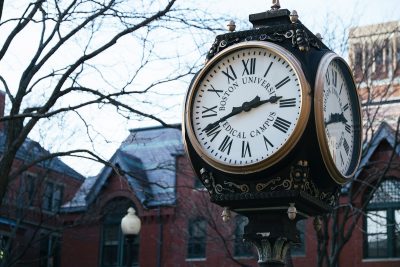
A Boston University research is continuing her fight to dismiss a subpoena filed by the National Hockey League, which she argues would disrupt their research on brain trauma. The subpoena demanded BU to produce documents regarding the research, including confidential information about research subjects.
Ann McKee, a researcher in the Chronic Traumatic Encephalopathy Center at BU, filed her second affidavit about the case Friday, the first one being filed in February, The Daily Free Press reported. McKee’s action is one of many that have been occurring over the last three months in a battle against the NHL in federal court.
“It is my strong belief that the NHL’s motion, if granted, could cause lasting damage to ongoing research on the long–term effects of repetitive trauma and on chronic traumatic encephalopathy,” McKee wrote in the affidavit.
The CTE Center’s website describes CTE as “a progressive degenerative disease of the brain found in athletes (and others) with a history of repetitive brain trauma.” The center’s focus is on conducting research on CTE and other consequences of repetitive brain trauma in order to identify risk factors, methods of detection, prevention and treatment.
In her first affidavit, McKee wrote that NHL’s subpoena was intrusive and it was “possibly aimed at undermining this entire field of discovery.”
In the second affidavit filed on Friday, McKee addressed a memo the NHL released in March to support its subpoena request. In the memo, the NHL stated a study done with Viagra had invalidated the CTE study’s results.
“It immediately struck me as odd that the NHL’s brief relies so heavily on a case that appears to be about a single research study involving a product, Viagra, rather than about multiple published studies involving an entire field of scientific inquiry, as is the case with CTE Center research,” McKee wrote.
When asked to comment, Lawrence Elswit, a lawyer for BU, said he agreed with the statements McKee made in her affidavit.
“The National Hockey League has overreached, vastly overreached,” Elswit said.
Both the NHL’s legal representation and BU’s spokesperson declined to comment on the lawsuit.
Tamar Frankel, a law professor at BU, said the NHL’s motion asks for so much of the CTE Center’s research, and it could injure all of their research, not just that which is relevant to the case.
“By asking for all of the research that was done, whether it was relevant or not, the defendant, in this case, imposes a great cost of the potential evidence given or a potential witness,” Frankel said.
Frankel said although the defendant is allowed to ask the court to demand information, she doesn’t think the court will not do anything irrational that could damage research or institutions.
“My gut is that the court will say that, ‘You have to show me more before I force an institution that does research to just spill everything over, show me the relevance, show me the connection, and limit it to a rational limit,’” Frankel said.
Frankel said the court would not allow the CTE Center to be injured by the NHL’s motion just to prove what they have already proven.
“[It sounds like] they will have to stop working to do the connection [between concussions and CTE] for the defendant — that doesn’t work,” Frankel said. “We have a system of laws that tries to promote justice, and sometimes it requires people, especially institutions, to offer their opinions.”
Several students at BU said they have conflicting opinions as to whether or not the CTE Center should give up all of its data.
Sarah Paco, a sophomore in the College of Arts and Sciences, saying that the link between concussions and later-life brain disease is already evident.
“I think that’s absolutely overreaching,” Paco said. “Other research centers besides BU have proven that there is a link between concussions and brain disease later on in life.”
Chao Liu, a junior in the College of Engineering, said he thinks the NHL is asking for this information just so that they can make an informed opinion.
“Generally, it’s skewed to have some information shared by people, so we can have a fair judgement,” Liu said. “I feel bad judgement is made by a lack of information, so I think this might be a good idea.”
Jazmine Rodriguez, a junior in CAS, said she believes the NHL’s request for the information is overwhelming, but having the data might help them confirm their request.
“If they could ask the patient’s families, the people who passed away, it would be interesting to see what the actual data behind this correlation is,” Rodriguez said. “Because correlation isn’t causation, which I’m sure it is in this case, but they should be able to prove what they are saying.”























































































































